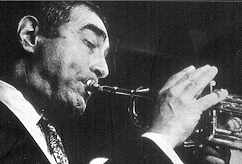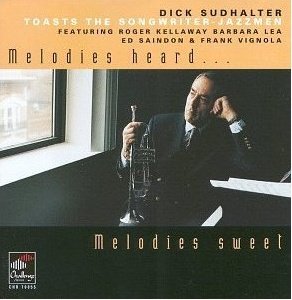 Dick Sudhalter wrote three of the most important books ever published about jazz and American popular music, Bix: Man and Legend, Lost Chords: White Musicians and Their Contribution to Jazz, 1915-1945, and Stardust Melody: The Life and Music of Hoagy Carmichael. He was also a trumpet player of great elegance and distinction who didn’t make nearly as many records as he should have, though Melodies Heard, Melodies Sweet showed him off to the best possible advantage.
Dick Sudhalter wrote three of the most important books ever published about jazz and American popular music, Bix: Man and Legend, Lost Chords: White Musicians and Their Contribution to Jazz, 1915-1945, and Stardust Melody: The Life and Music of Hoagy Carmichael. He was also a trumpet player of great elegance and distinction who didn’t make nearly as many records as he should have, though Melodies Heard, Melodies Sweet showed him off to the best possible advantage.
In private life Dick was as dapper as his playing, and old-fashioned in all the best ways. He liked Chicago-style jazz, British tailoring, black-and-white movies, Marmite, and The New Yorker before Tina Brown got her hands on it. Not surprisingly, he was more than a little bit at odds with much of the modern world, and I suspect that he would have been vastly happier had he been born in 1908 instead of 1938. He was also a pessimist by nature, but like many such folks, he gave more pleasure than he got–and, I suspect, got more pleasure than he usually cared to admit.
Dick and I were close friends, and so it grieved me deeply when his body began to betray him a few years ago. First came a stroke that robbed him of the power to play his horn and left him increasingly slow of speech (though never of mind). Then he fell victim to multiple system atrophy, an appalling disease that in time made it impossible for him to talk at all. That such an ailment should have struck down so brilliantly articulate a man was one of those horrific ironies with which life likes to remind us that it holds the whip hand.
 I knew that Dick wanted to die–he told me so while he still could–and so I suppose I should be glad that his suffering is now over. Yet I find it impossible to greet the news of his death with anything other than black sorrow, though I know that it will someday be a comfort to have his books to read and his records to play. When I heard that he was dying, I sat quietly in my hotel room for a few minutes, then opened up my iBook and listened to the sweetly elegiac performance of Duke Ellington’s “Black Butterfly” that he recorded with Roger Kellaway in 1999 (it’s on Melodies Heard, Melodies Sweet). It isn’t given to very many of us to write our own epitaphs, much less play them, but I can’t think of a better way to sum up what Dick Sudhalter was all about than to listen to that song.
I knew that Dick wanted to die–he told me so while he still could–and so I suppose I should be glad that his suffering is now over. Yet I find it impossible to greet the news of his death with anything other than black sorrow, though I know that it will someday be a comfort to have his books to read and his records to play. When I heard that he was dying, I sat quietly in my hotel room for a few minutes, then opened up my iBook and listened to the sweetly elegiac performance of Duke Ellington’s “Black Butterfly” that he recorded with Roger Kellaway in 1999 (it’s on Melodies Heard, Melodies Sweet). It isn’t given to very many of us to write our own epitaphs, much less play them, but I can’t think of a better way to sum up what Dick Sudhalter was all about than to listen to that song.
UPDATE: Doug Ramsey, another of Dick’s friends, pays eloquent tribute to him here.
This posting from the Chicago Reader‘s media blog tells of another slice of Dick’s life, one about which I knew little–his work as a foreign correspondent.
The New York Times obituary is here.
The Washington Post obituary is here.
Further thoughts from Patrick Kurp at Anecdotal Evidence.
